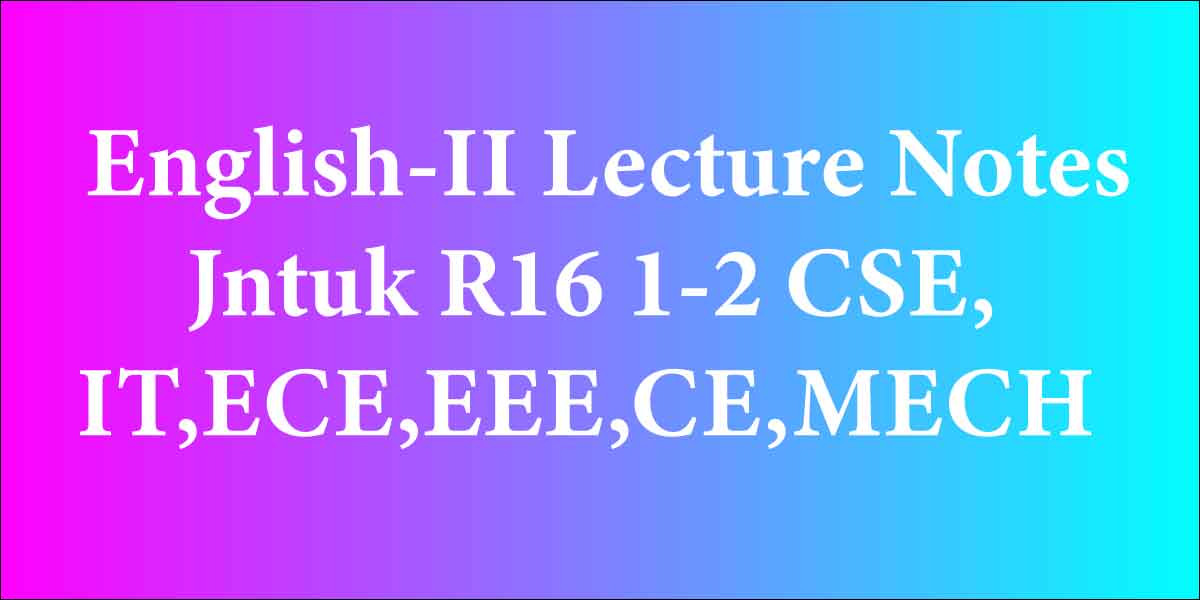ENGLISH -II
Introduction:
Visible of the growing importance of English as a tool for international communication and also the
consequent stress on coaching the scholars to accumulate communicative competency, the programme
has been designed to develop linguistic and communicative competency of the scholars of
Engineering.
As way because the elaborate Textbooks area unit involved, the main target ought to air the talents of listening,
speaking, reading and writing. The nondetailed Textbooks area unit meant for in depth reading for
pleasure and profit.
therefore the strain within the programme in totally on the event of communicative skills and
fostering of ideas.
Objectives:
- To imporve the language proficiency of the scholars in English with stress on LSRW
skills. - To change the scholars to review and comprehend the prescribed lessons and subjects additional
effectively with reference to their theorotical and sensible elements. - To develop the communication skills of the scholars in each formal and informal
situations.
- LISTENING SKILLS:
- Objectives:
- To change the scholars to understand the role of listening talent and improve their
pronounciation. - To change the scholars to grasp the speech of individuals happiness to totally different
backgrounds and regions. - To change the scholars to pay attention for general content, to stock up data and for specific
information.
I Year – II Semester
L T P C
4 0 0 3
ENGLISH -II
SPEAKING SKILLS:
Objectives:
- to form the scholars awake to the importance of speaking for his or her personal and
professional communication. - To change the scholars to precise themselves fluently and accurately in social and
professional success. - to assist the scholars describe objects, things and other people.
- to form the scholars participate in cluster activities like roleplays, discussions and
debates. - to form the scholars particiapte in only a moment talks.
READING SKILLS:
Objectives: - To change the scholars to grasp a text through silent reading.
- To change the scholars to guess the meanings of words, messages and inferences of texts
in given contexts. - To change the scholars to skim and scan a text.
- To change the scholars to spot the subject sentence.
- To change the scholars to spot discourse options.
- To change the scholars to form intensive and in depth reading.
WRITING SKILLS:
Objectives: - to form the scholars perceive that writing is a certain formal skills.
- To change the scholars to put in writing sentences and paragraphs.
- to form the scholars establish and use acceptable vocabulary.
- To change the scholars to narrate and describe.
- To change the scholars capable of note-making.
- To change the scholars to put in writing coherently and cohesively.
- to form the scholars to put in writing formal and informal letters.
- To change the scholars to explain graphs victimisation expressions of comparision.
- To change the scholars to put in writing techincal reports.
Methodology: - the category area unit to be learner-centered wherever the learners area unit to browse the texts to induce a
comprehensive plan of these texts on their own with the assistance of the coevals and also the
teacher. - Integrated talent development methodology needs to be adopted with specialize in individual
language skills as per the tasks/exercise. - The tasks/exercises at the top of every unit ought to be completed by the learners solely and
the teacher interventionis perimitted as per the complexness of the task/exercise. - The teacher is anticipated to use supplementary material where necessary and conjointly
generate activities/tasks as per the necessity. - The teacher is perimitted to use lecture methodology once a very new thought is
introduced within the category.
Assessment Procedure: Theory - The formative and summational assessment procedures area unit to be adopted (mid exams and
end semester examination). - Neither the formative nor summational assessment procedures ought to check the memory of
the content of the texts given within the textbook. The themes and international comprehension of
the units within the gift day context with application of the langauge skills learnt within the
unit area unit to be tested. - solely new unseen passages area unit to tend to check reading skills of the learners. Written
skills area unit to be tested from sentence level to essay level. The communication formats—
emails,letters and reports– area unit to be tested in conjunction with acceptable langauge and
expressions. - Examinations:
I middle communication + II middle communication (15% for descriptive tests+10% for on-line tests)= twenty fifth
(80% for the most effective of 2 and 2 hundredth for the other)
Assignments= five-hitter
finish semester exams=70% - 3 bring home assignments area unit to tend to the learners wherever they’ll have to be compelled to browse
texts from the reference books list or alternative sources and write their gist in their own
words.
The following text books area unit suggested for study in I B.Tech II Semester (Common for all
branches)and I B.Pharma II Sem of JNTU Kakinada from the tutorial year 2016-17 (R-16
Regulations)

